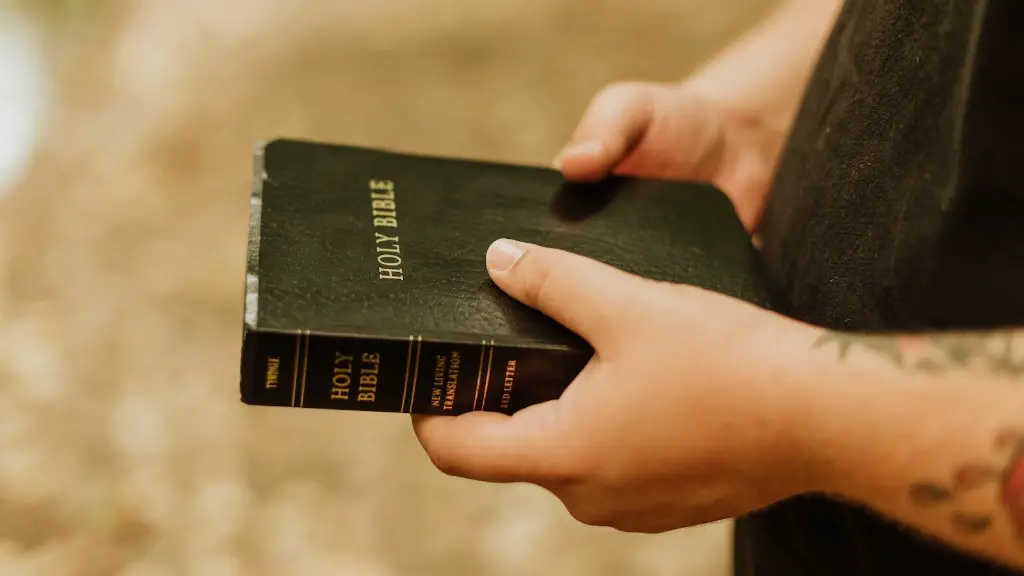Context and Definition
Masturbation is one of the oldest topics in the Bible with many interpretations. To understand it better, it’s important to define the word. According to the Merriam-Webster dictionary, masturbation is “the stimulation of one’s own genital organs, usually to orgasm, by manual contact or means other than sexual intercourse.” To put it simply, it is a self-induced sexual activity. Although there has been much debate about whether or not masturbation is a sin, it isn’t clearly and directly addressed in the Bible.
Context of the Bible
The Bible is an essential source for Christian principles and teachings. It is divided into two parts, the Old Testament and the New Testament. The Old Testament explains the relationship between God and humans and includes stories and teachings from the Hebrew Bible. The New Testament includes stories from Jesus and the profound words shared by the Apostles. In other words, the Bible is essential to understanding the teachings and beliefs in the Christian faith.
Argument For Masturbation as a Sin
There are some people who believe that masturbation is a sin in the Bible. The Leviticus 18:17 states, “You shall not uncover the nakedness of a woman and of her daughter, nor shall you take her son’s daughter or her daughter’s daughter, to uncover her nakedness; they are relatives; it is wickedness.” This verse is often interpreted as prohibiting all types of sexual activity not involving a husband and wife, including masturbation. Other verses, such as Corinthian 6:18, also bar any kind of sexual activity outside of marriage: “Let no one deceive you with empty words, for because of such things God’s wrath comes on those who are disobedient.”
Argument Against Masturbation as a Sin
On the other hand, some scholars beg to differ. For starters, masturbation does not have the same explicitly specified in the Bible as many other sexual sins do, such as adultery or homosexuality. Therefore, making a definitive judgment is difficult. Moreover, without complete clarity of the Bible on the topic, many Christian scholars have adopted a more moderate position, calling upon individuals to use their conscience and personal discernment when it comes to masturbation.
Different Perspectives
The issue of whether or not masturbation is a sin in the Bible is largely a gray area. While some people consider it to be a sin, others consider it to be a morally permissible activity as long as it does not lead to further immorality. Pope John Paul II took a moderate stance on masturbation, noting that it does not have the same kind of moral weight as other sexual sins and calling for individuals to use their personal discernment.
Understanding the Bible
Therefore, each individual can form his or her own opinion based on the cultural context and norms of the Bible. It could be argued that the Bible is meant to serve as a moral guidance, not a rule book. Therefore, it is up to each individual to examine the text and decide what is right or wrong in regards to masturbation.
Seeking Spirituality
Furthermore, masturbation as a larger theme should be addressed and not just seen as a sin or a taboo. Masturbation should be approached as an opportunity to seek spiritual wellbeing. To do this, individuals should pause and take some time to review their thoughts and feelings, check in and reflect on their actions and choices. Masturbation can be seen as not only a release, but also as an opportunity to explore new ideas and find deeper understanding about oneself.
Sexual Pleasure Outside Marriage
The Bible is clear when it comes to sexual pleasure outside of marriage being considered a sin. Masturbation is seen as an intimate act and therefore, should be seen in the same light as other sexual activities and perspectives. Thus, it is important to examine the heart and motivation behind the act.
Friendship and Intimacy
Regardless of where individuals stand on whether masturbation is a sin or not, what’s even more important to keep in mind is that sexual pleasure outside of a loving, committed relationship can be damaging to both individuals involved. Masturbation can lead to feelings of loneliness and sadness if it is done as a substitute for authentic friendship and intimacy. Therefore, masturbation should be practiced with caution and the intention of deeper exploration and connection with oneself, rather than a quick fix or an escape from reality.
Brain Chemistry
The changes that occur in the body during masturbation is yet another aspect to consider when analyzing if masturbation is a sin in the Bible or not. Research has shown that during orgasm, a number of neurotransmitters are released in the brain, including dopamine and oxytocin. These chemicals have been linked to improved mental and physical health, including lowered stress levels and decreased anxiety.
Exploring Sexuality
Masturbation can be a healthy way to explore and connect with one’s own sexuality in a safe, respectful manner. It is important to remember that it is something personal and should be practiced mindfully. That said, it is essential to have a strong sense of self-control and aim for pleasure with respect for one’s body and sexuality.
Balancing Faith and Respect
The most important aspect to consider when talking about masturbation and whether it is a sin in the Bible is making sure that one is not acting in a way that disrespects oneself or one’s faith. Ultimately, how individuals approach their faith is a personal journey and should be explored with compassion and respect.



